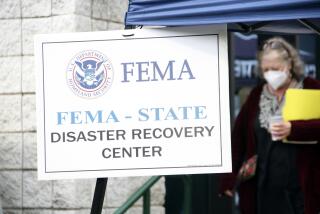Ex-FEMA chief sticks with disaster-response industry
- Share via
WASHINGTON — Nearly two years after Hurricane Katrina overwhelmed New Orleans, Michael D. Brown, who bore the brunt of the criticism for the federal response to the storm, has moved into a career promoting disaster-response and data-mining technology for government agencies and private customers.
Brown, who served as director of the Federal Emergency Management Agency when Hurricane Katrina blasted New Orleans and the Gulf Coast on Aug. 29, 2005, has not returned to New Orleans in nearly two years. His last stop was Sept. 11, 2005, the day before he resigned.
The next time he sees New Orleans, Brown ruefully suggests, it may be in response to lawsuits resulting from Katrina, which left more than 1,000 dead and tens of thousands homeless.
Living in Boulder, Colo., Brown has become a traveling salesman for private firms selling computer software, high-tech machinery and communications technology. One of the companies focuses on anti-terrorism, helping airlines detect potential patterns in the flying public.
Others specialize in disaster response, helping communities rebuild and providing technology so the military and first responders can manage casualties.
“I probably, at any one time, have a half-dozen clients involved in different things having to do with homeland security or government in general,” Brown said in an interview. “I am called corporate advisor. Some places, I am called vice president for corporate relations. I am called all kinds of names.”
Brown was certainly called all sorts of names in New Orleans in the aftermath of Katrina. And some of his critics wonder how a former federal official who came to symbolize inept emergency response can be selling disaster relief products to the government.
“He’d probably be tarred and feathered if he came back,” said Anne Milling, founder of Women of the Storm, a group that specializes in persuading members of Congress to visit the Gulf Coast. “I just question people’s competence and expertise in these areas when they haven’t demonstrated them prior. . . . One would have to question his competence and capabilities.”
David Fukutomi, a private consultant who worked for FEMA for eight years, said, “There is a certain amount of irony in that an individual who was perceived to be as big a failure as he was, fairly or unfairly, is back advising people how to succeed.” Still, he said, Brown “is probably on a long list of people, if you are going to talk about culpability. Does he deserve to be the face of it? . . . No.”
A small startup company Brown represents, InferX, has found work with the Pentagon’s Missile Defense Agency, Brown said, and is attempting to sell its services to airlines and agencies that monitor passengers for potential terrorist threats. The McLean, Va.-based firm lists several government clients, including the Air Force, Navy and IRS.
Brown also represents a Las Vegas-based firm, Noninvasive Medical Technologies, which makes healthcare monitors and has a contract with the Air Force for combat-casualty care. Its wireless equipment allows medics to set up triage in the field. “I could have used this in Katrina, in a heartbeat,” Brown said.
And he is doing work for Atlanta-based Charys Holding Co., whose companies, Cotton Cos. and Viasys Services, build and restore wireless communications -- such as cellphone towers and fiber-optic networks.
The government’s failure to respond swiftly as thousands piled into the Louisiana Superdome marked a turning point in the public’s disenchantment with the administration. President Bush’s commendation for Brown four days after the storm has become a sarcastic figure of modern-day speech: “Brownie, you’re doing a heck of a job.”
Ten days later, Brown was gone, leaving behind a string of e-mails that exposed a lackadaisical response from the agency charged to be the first response to natural disasters.
Yet Brown himself had complained that the once-nimble FEMA had been melded into the bureaucracy of the Department of Homeland Security, and he blamed DHS Secretary Michael Chertoff for a bureaucratic turf mentality. In early 2005, Brown wrote a memo warning that DHS had “created a top-heavy organization” that promoted “unfocused empire-building.”
“There is life after government,” Brown said, with a caustic assessment of how he was treated, “even after you have been run through the wringer, even after you have been thrown under the bus by the leader of the free world.”
More to Read
Sign up for Essential California
The most important California stories and recommendations in your inbox every morning.
You may occasionally receive promotional content from the Los Angeles Times.













